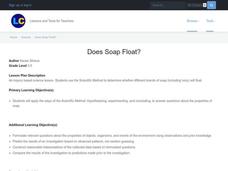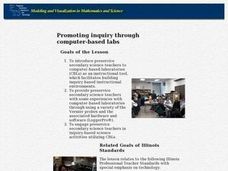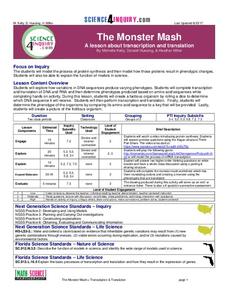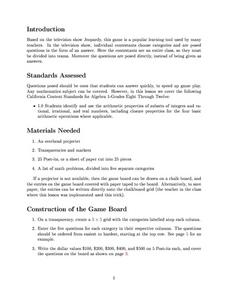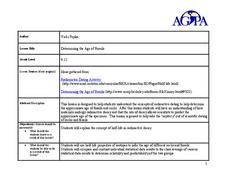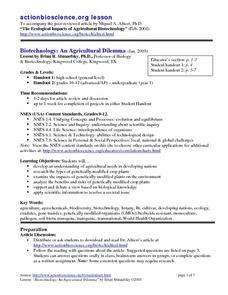Curated OER
Scientific Inquiry
Young scholars investigate the general geology, biology, and chemistry of Seneca Lake. They study how to use scientific instruments on the research vessel. They explain how the data they gather will be used by scientists and develop a...
Curated OER
Floating Soap
Young scholars use the Scientific Method steps to complete an experiment on various brands of soap to determine their floating capabilities. In this scientific method lesson, students write a hypothesis about the ability of various soap...
Curated OER
Heat Up the Floating Plates
Eighth graders research the connection between the convection currents within the mantle of the earth and the moving of Earth's plates. A connection to lessons at previous grade levels on the rock cycle and important background...
Curated OER
A "Real" Picuture of a Scientist
Students share their own stereotypes when they talk about scientists. In groups, they draw a picture of a scientist where they are working and the tools they most commonly used. Using the internet, they discover how archeolgists use the...
Curated OER
Exploring the Physical and Chemical Properties of Polymers
Students identify the physical and chemical properties and explore the differences. In physical and chemical property lesson plan students test polymers for the differences between the physical and chemical properties, record their...
Curated OER
Muscular and Skeletal Systems
How do muscles move bones? Find out using a built-in-class model. Pupils construct a hand model with paper and string, then follow a series of directions to explore the movement process. Discover additional information about the muscular...
Tracy Pendry
Cardiovascular/Circulatory System
Explore the circulatory system with a cardiovascular pump activity that promotes discovery and discussion as class members create a functioning model of the heart. Continue the learning process through a web quest showcasing the...
Curated OER
The Floristic Relay: A Game to Teach Succession
Students investigate the concept of succession and plant community dynamics. They play a game in order to conduct multiple experiments while playing. The interest of the game is useful for keeping student interest throughout the activity.
Curated OER
Promoting Inquiry Throught Computer-Based Labs
Student Teachers are given the opportunity to examine how to use a computer-based laboratory for inquiry. The practice is done to teach future teachers how to use these tools so they can be ready for use in the classroom environment.
Curated OER
Fun with Balloons
Fifth graders design their own hot air balloon. In this science lesson, 5th graders investigate how factors like weight and sizes affect a balloon's lifting power. They also write math problems based on facts written in the...
Curated OER
Cycles Review
Eighth graders discuss the four major cycles of matter. In this general science lesson, 8th graders decide which of the four is the most important. They share their opinion in class.
Science 4 Inquiry
The Monster Mash
Young scientists create monsters by applying their knowledge of transcription and translation. They randomly find the DNA, assign it a codon, and build monsters piece by piece.
Curated OER
Making a Battery
Fifth graders make a battery. In this physical science lesson, 5th graders word in pairs make the battery. Students follow 4 steps to create the battery.
Curated OER
Let It Roll
Students experiment in order to see how ball bearings work. In this science activity lesson, students conduct an experiment where they make and examine a ball bearing. Students brainstorm other examples of ball bearings and discuss...
Curated OER
Observations and Inferences
Students observe how to distinguish observations form inferences. In this examining inferences lesson students list observations relating to the activity and discuss the importance of them.
Curated OER
Magnetic Discovery Bottle
Students examine how to conduct simple investigations and use simple equipment to gather data. For this magnet lesson students decide what types of objects are attracted to magnets.
Curated OER
Measure for Measure: Time & Temperature
Young scholars examine scientific inquiry. In this time and temperature lesson students create a template to solve scientific problems and work through a science problem.
University of Colorado
The Moons of Jupiter
Middle schoolers analyze given data on density and diameter of objects in space by graphing the data and then discussing their findings. This ninth installment of a 22-part series emphasizes the Galilean moons as compared to other...
Curated OER
Mathematical Jeopardy
Middle schoolers use the popular game of Jeopardy to explore different mathematical concepts. They are highly engaged with the use of technology for this lesson plan. They function using higher-order thinking skills in order to create...
Curated OER
Red, Green, and Blue Mystery Liquids! Hypothesis or Inference?
Eighth graders are actively involved in the scientific method and inquiry as they form quick hypotheses based upon a teacher set of mystery liquids. They determine the need to make additional observations of the liquids.
Curated OER
Determining the Age of Fossils
Students examine the concept of radioactive dating. In this radioactive dating activity, students investigate how to determine the ages of fossils and rocks as they learn about half-life radioactive decay.
Curated OER
Gridding a Site
Students establish a grid system over an archaelogical site. They label each grid unit. They determine the location of artifacts within each grid unit. They construct a scientific inquiry concerning the location of artifacts on the site.
Curated OER
Can You Get A Charge Out Of Matter?
Students observe and demonstrate how objects can be charged positively and negatively and how static electricity works. They observe a teacher-led demonstration, and in small groups rotate through various static electricity activities,...
Curated OER
Biotechnology: An Agricultural Dilemma
Students investigate the types of genetically modified crop plants there are and the benefits and risks of such plants. The agricultural needs in developing nations for this biological knowledge to resolve societal issues is also...

